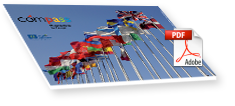How are the learning achievements assessed in relation to the competences?
There can be various approaches to cope with situations successfully, this is also true of task-and problem -solving. Therefore it is difficult to use the standard terms “correct“ or “wrong“ to determine whether the result meets the expectations. In fact, the assessment as to whether the chosen approach has led to the desired result in an efficient way, depends on the perception of the parties involved.
Within the scope of a mobility project, the completion of and coping with everyday situations abroad can be assess as special achievement by the mobility participants, whereas the representatives of the sending or hosting organisations may consider this a matter of course. On the other hand, it may happen that mobility participants assess their work achievements made during the work placement as poor, whereas the hosting companies consider them very satisfactory.
Consequently, there must be a dialogue to assess competence-related learning achievements to align the participants’ self-assessment and third-party evaluation. The learners have to assess themselves in which fields they have acquired additional skills which is then certified by the teaching staff with their own assessment of the achievements.
Therefore, the mobility participants are expected to show personal responsibility to design and assess the learning process. The E-portfolio of the COMPASS Method serves this purpose. It provides the mobility participants with a platform to record and present learning achievements that allow reference to their learning progress and the achievement of agreed learning objectives. The teaching staff should therefore aim at motivating the mobility participants to describe their learning achievements in a most detailed and comprehensive way.
The information provided in the E–portfolio, in turn, is the basis of the assessment of learning achievements in a dialogue. The previously agreed learning objectives constitute the assessment standards. In the assessment interview , it can be jointly agreed in how far the described learning achievements comply with the expectations and in which fields competence gains can be established.
This positive and reassuring assessment method allows to document learning progress in individual competence areas if the respective mobility participants were not able to achieve all learning objectives during the work placement.









